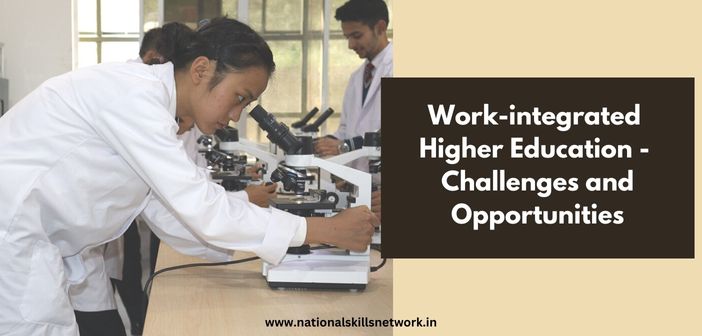Guest author – Dr. Amiya Singh, Pro-Vice Chancellor, Medhavi Skills University

The changing nature of global work demands highly skilled employees and professionals with exceptional knowledge and industry-relevant skills. Employers also expect prospective employees to have industry exposure or experience even for their first job. This brings in the need to align the curriculum and academic processes with the industry demand and create opportunities for students to acquire hands-on learning in the industry setup.
What is work-integrated higher education
Work-integrated learning or work-integrated higher education is a form of experiential education that formally integrates a student’s academic studies with quality experiences within a workplace or practice setting. Be it apprenticeships, on-the-job training (OJT), project-based engagement etc., the skills-to-value enabling platform helps in accelerating the student’s competencies through various entry-level job role/s. Such opportunities enhance the employability quotient of the learner and aid in personal and professional growth while enhancing the educational experience.
Successful implementation of work-integrated higher education programmes requires an engaging ecosystem from all stakeholders: academic institutions, industry, government, and students. However, integrating higher education with work comes with its own challenges and opportunities.

Here are some of the challenging areas, where integrated efforts can bring improvement –
- Industry collaboration – Access to industry partners and strategic collaboration for the right type of on-the-job training to maximize the programme outcomes is somehow out of the reach of the HEIs due to the prolonged industry-academia gap. Awareness needs to be created among industry and business networks towards the potential of futuristic optimal value propositions such collaborations can lead to, thereby making it a win-win model for growth.
- Learning integration and academic outcomes – Acquiring the progression of industry skills relevant to the programme requires appropriate fitment of job roles and learning opportunities. Therefore, key priorities related to the alignment of job roles, diversity, specializations, engagement hours, the role of industry etc. are required to be channelized to create a conducive environment and effective partnerships between Industry and academia.
- Promotion and advocacy by the government – Skilling-led (long-term) higher education (Degree, Diploma etc.) has been perceived to be more aspirational for the youth for career progression. In line, NEP 2020 emphasizes on the acquisition of skills and employability as an integral part of the formal education system. National Credit Framework (NCrF) provisions towards establishing academic equivalence and offering seamless mobility between vocational and education tracks. Prioritization on skilling and apprenticeships in the recent union budget is much overwhelming. It’s the right time for Government to support in enabling the desired shift from an “Industry-partnered to an Industry-led” approach to work-integrated higher education inviting more participation and promotion from the industry side followed by its internationalization.
- Approaching the curriculum and technology integration – With the digital transformation of industry sectors and increasing adoption of technology, industry needs are also evolving. Therefore, there is a need for innovation to introduce flexibility to revise the curriculum to fit the industry requirements. Also, there is the need to build appropriate instructional models, accessible technology platforms, easy content integration, a self-paced learning environment and establish a blended academic ecosystem. It is the technology-driven platforms that support transparency and accountability in the monitoring of outcomes and evaluate the progress.
- Student readiness – Students are more accustomed to academic learning that does not prepare them for the real world of work. Learning within a protective environment and structured framework has been the practice since early education. In contrast, learning in the industry environment could be new to many students. If they need to be sensitized about how it prepares them to for the real world of work with several life skills, besides hands-on work exposure.
- Social acceptance and aspiration – When it comes to social acceptance in education, the crucial stakeholders are parents, teachers and peers. Most of them are not aware of the changing world of work that needs practical/industry exposure to accept the new model. Therefore, it is important to create awareness to perceive it right away. This will help them understand its benefits through a wide range of career opportunities in future.
Also read: Top 5 ways Higher Education Institutions (HEI) can meet the needs of the industry – https://nationalskillsnetwork.in/top-5-ways-higher-education-institutions-hei-can-meet-the-needs-of-the-industry/
Even though work-integrated higher education is situated in a complex world of challenges, these can be converted into opportunities for various stakeholders as per the following –
- For students – Along with theoretical understanding, work-integrated higher education provides opportunities for students to gain soft skills and technical skills by practice at the real workplace with the scope of stipend during on-the-job training. In addition to financial independence, the compounded growth in professional skills and life skills improves their chances of employability and empowers them to get into valued entry-level employment after the completion of the programme.
- For industry – Well-trained students who can get productive from day one of their jobs are an asset to any industry. In terms of employment, they are valued more with better opportunities for career progression thus empowering the workforce. Besides, the OJT component benefits the industry in terms of improved retention, subsequently productivity among individuals and future team-building opportunities.
- For national and global HR – It allows students, and the future workforce, to participate efficiently in the labour market and contribute to the progress of the nation along with leading fulfilling lives. With a skilled workforce in place, the national and global HR would spend fewer resources on further training, increase profitability, create a good working relationship, and have a pool of trained individuals who are productive and capable of efficient problem-solving.
- For society –It provides access to an inclusive ecosystem for professional higher education with ‘learn and earn opportunities. This enables not just the personal development of the individuals but also promotes economic, technological and social progress.
- For higher education institutions – Work-integrated higher education opens new avenues for the industry’s active participation beyond placements i.e.; in training activities, curriculum development, OJT supervision and assessment and more. Subsequently, it helps towards bridging the industry-academia gap.
Integrating work with higher education through industry-relevant courses and programmes improves the learning experience of students, along with mutually beneficial outcomes like better employability, knowledge and skill mobility, livelihood enablement and life-long learning. Therefore, it is important to invest in building the right infrastructure, training academic resources, creating awareness and promoting effective collaboration between industry and academia to make the most of work-integrated higher education.





